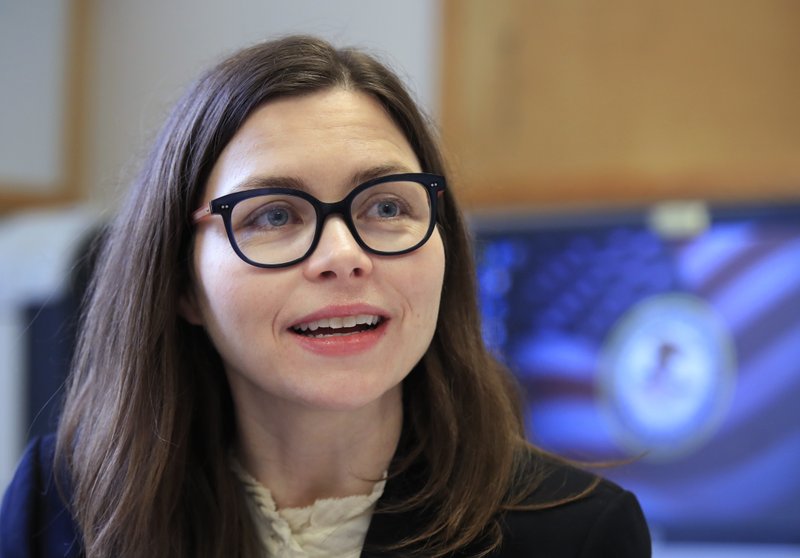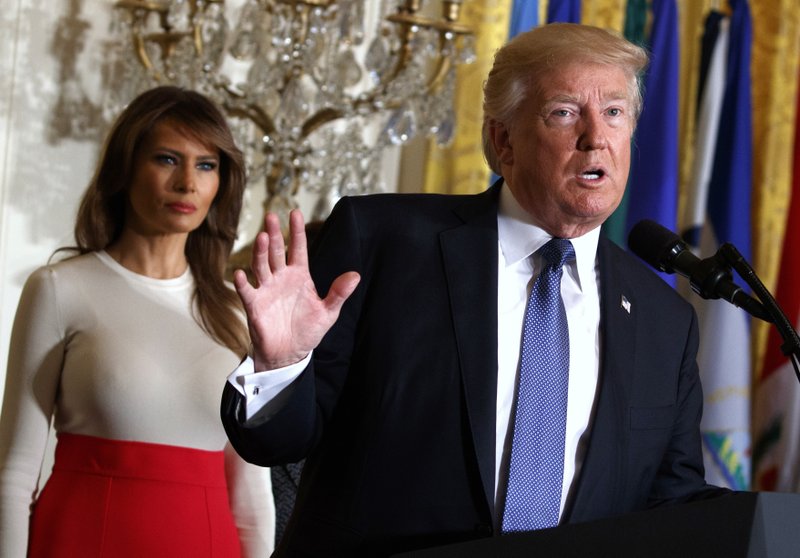Prosecutor on Justice’s opioid crackdown favors tough tact

Mary Daly has heard the criticism: That the tough-on-drugs approach favored by the Trump administration is cruel, ineffective and a return to the failed policies of the 1980s. She’s not buying it. “We need to use tough prosecutions if we are going to get our way out of this epidemic,” said Daly, a longtime federal drug prosecutor recently tapped to oversee the Justice Department’s ambitious efforts to attack America’s opioid abuse crisis. “We don’t ignore the need for prevention and treatment efforts, but the notion that tough enforcement is the wrong approach is wrong.” Daly, who prosecuted gang members and drug traffickers for 13 years in New York and Virginia, said her work has given her a close-up look at the drug problem. President Donald Trump and Attorney General Jeff Sessions have made combatting the opioid epidemic a cornerstone of the crime-fighting agenda they both share. Trump has encouraged the use of the death penalty against traffickers when possible, a request Sessions then codified in a directive to federal prosecutors. Daly wasn’t responsible for that policy, but her selection aligns with the tough approach. She said she supports Sessions’ undoing of an Obama-era policy that aimed to show more leniency to lower-level drug offenders. And she favors strict enforcement to rein in the epidemic that saw a record 42,000 opioid related overdose deaths in 2016. The daughter of William Barr, who was attorney general under President George H.W. Bush, Daly was responsible for some of the biggest and most complex international drug trafficking cases in the Eastern District of Virginia, maintaining a heavy case load even as supervisor of the narcotics unit, said James L. Trump, a fellow prosecutor who worked alongside her there. She brought a quiet confidence to the courtroom, and a desire for fairness and consistency, he said. “She believed that adherence to the law and consistency with the law would bring about just results,” said Trump, who has no relation to the president. “If there was a philosophy, it is what I find in most good prosecutors which is that the law is the law, whether our personal beliefs are different in terms of sentencing policy doesn’t really matter.” In her new role, much of Daly’s focus will be on fentanyl, the deadly painkiller fueling the crisis. Under her watch, the Justice Department is going after dealers who use the anonymity of the internet to peddle fentanyl from overseas into American homes, pharmacies and doctors who recklessly overprescribe pain pills, as well as the kind of major traffickers Daly prosecuted in the field. “We have a unique drug on the table in fentanyl. Very small quantities can kill people,” Daly said, adding that the deadly narcotic is showing up in cocaine and other less lethal drugs. “We do have to recalibrate a bit in terms of how we’re addressing the fentanyl threat and that may mean looking at people who are supplying lower quantities.” Both conservative and liberal critics fear such a philosophy could mark a return to the policies of the 1970s and 80s that unduly affected minority communities and flooded prisons by ensnaring mid- to low-level dealers. “It’s deadly, I get that, but that’s why we need to treat it in a really thoughtful way,” said Mark Holden, general counsel for the conservative Koch network. The left-leaning Brennan Center said the department’s focus should be on major traffickers. But it also pointed to efforts to target opioid manufacturers and distributors, which Daly also oversees, as a positive step. Already under Daly’s watch, the Justice Department has thrown its weight behind local officials in hundreds of lawsuits against the manufacturers and distributors of opioid painkillers. Prevention and treatment are also part of the department’s larger strategy, with prosecutors recommending treatment as part of a sentence and grant money devoted to programs. “I would argue they go hand-in-hand,” Daly said. “Oftentimes enforcement provides a good intervention in someone’s life to get them into treatment in a way that nothing else does.” Republished with permission from the Associated Press.
Donald Trump opioid plan includes death penalty for traffickers

President Donald Trump’s plan to combat opioid drug addiction calls for stiffer penalties for drug traffickers, including the death penalty where appropriate under current law, a top administration official said. It’s a fate for drug dealers that Trump has been highlighting publicly in recent weeks. Trump also wants Congress to pass legislation reducing the amount of drugs needed to trigger mandatory minimum sentences for traffickers who knowingly distribute certain illicit opioids, said Andrew Bremberg, Trump’s domestic policy director, who briefed reporters Sunday on the plan Trump is scheduled to unveil Monday in New Hampshire, a state hard-hit by the crisis and that he once referred to as “drug infested.” The president will be joined by first lady Melania Trump, who has shown an interest in the issue as it pertains to children. Trump drew criticism last year after leaked transcripts of his telephone conversation with Mexico’s president showed he had described New Hampshire as a “drug-infested den.” The Washington Post published the transcripts. Death for drug traffickers and mandatory minimum penalties for distributing certain opioids are just two elements under the part of Trump’s plan that deals with law enforcement and interdiction to break the international and domestic flow of drugs into and across the U.S. Other parts of the plan include broadening education and awareness, and expanding access to proven treatment and recovery efforts. Trump has mused openly in recent weeks about subjecting drug dealers to the “ultimate penalty.” The president told the audience at a Pennsylvania campaign rally this month that countries like Singapore have fewer issues with drug addiction because they harshly punish their dealers. He argued that a person in the U.S. can get the death penalty or life in prison for shooting one person, but that a drug dealer who potentially kills thousands can spend little or no time in jail. “The only way to solve the drug problem is through toughness,” Trump said in Moon Township. He made similar comments at a recent White House summit on opioids. “Some countries have a very, very tough penalty — the ultimate penalty. And, by the way, they have much less of a drug problem than we do,” Trump said. “So we’re going to have to be very strong on penalties.” White House officials referred questions about the death penalty and drug traffickers to the Justice Department, which said the federal death penalty is available for several limited drug-related offenses, including violations of the “drug kingpin” provisions in federal law. Doug Berman, a law professor at Ohio State University, said it was not clear that death sentences for drug dealers, even for those whose product causes multiple deaths, would be constitutional. Berman said the issue would be litigated extensively and would have to be definitively decided by the U.S. Supreme Court. Opioids, including prescription opioids, heroin and synthetic drugs such as fentanyl, killed more than 42,000 people in the U.S. in 2016, more than any year on record, according to the Centers for Disease Control and Prevention. Trump has declared that fighting the epidemic is a priority for the administration but critics say the effort has fallen short. Last October, Trump declared the crisis a national public health emergency, short of the national state of emergency sought by a presidential commission he put together to study the issue. “We call it the crisis next door because everyone knows someone,” said Kellyanne Conway, a Trump senior adviser. “This is no longer somebody else’s community, somebody else’s kid, somebody else’s co-worker.” Trump will also discuss how his plans for a U.S.-Mexico border wall and punishing “sanctuary” cities that refuse to cooperate with federal immigration authorities will help combat the opioid crisis, Conway told reporters traveling with the president. Other elements of the plan Trump call for a nationwide public awareness campaign, which Trump announced last October, and increased research and development through public-private partnerships between the federal National Institutes of Health and pharmaceutical companies. Bremberg said the administration also has a plan to cut the number of filled opioid prescriptions by one-third within three years. The stop in New Hampshire will be Trump’s first as president. He won the state’s 2016 Republican presidential primary but narrowly lost in the general election to Hillary Clinton. It follows a visit to the state last week by retiring Sen. Jeff Flake, R-Ariz., a persistent Trump critic. Flake told New Hampshire Republicans that someone needs to stop Trump — and it could be him if no one else steps up. Republished with permission from the Associated Press.


